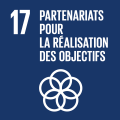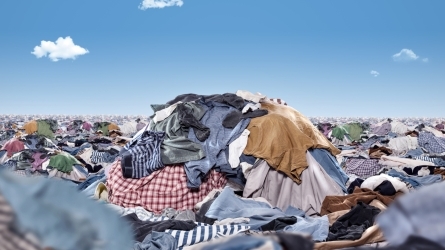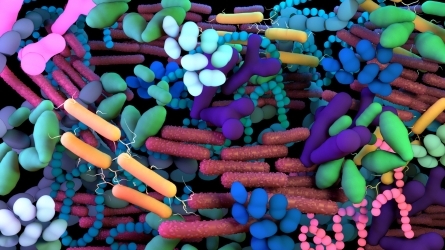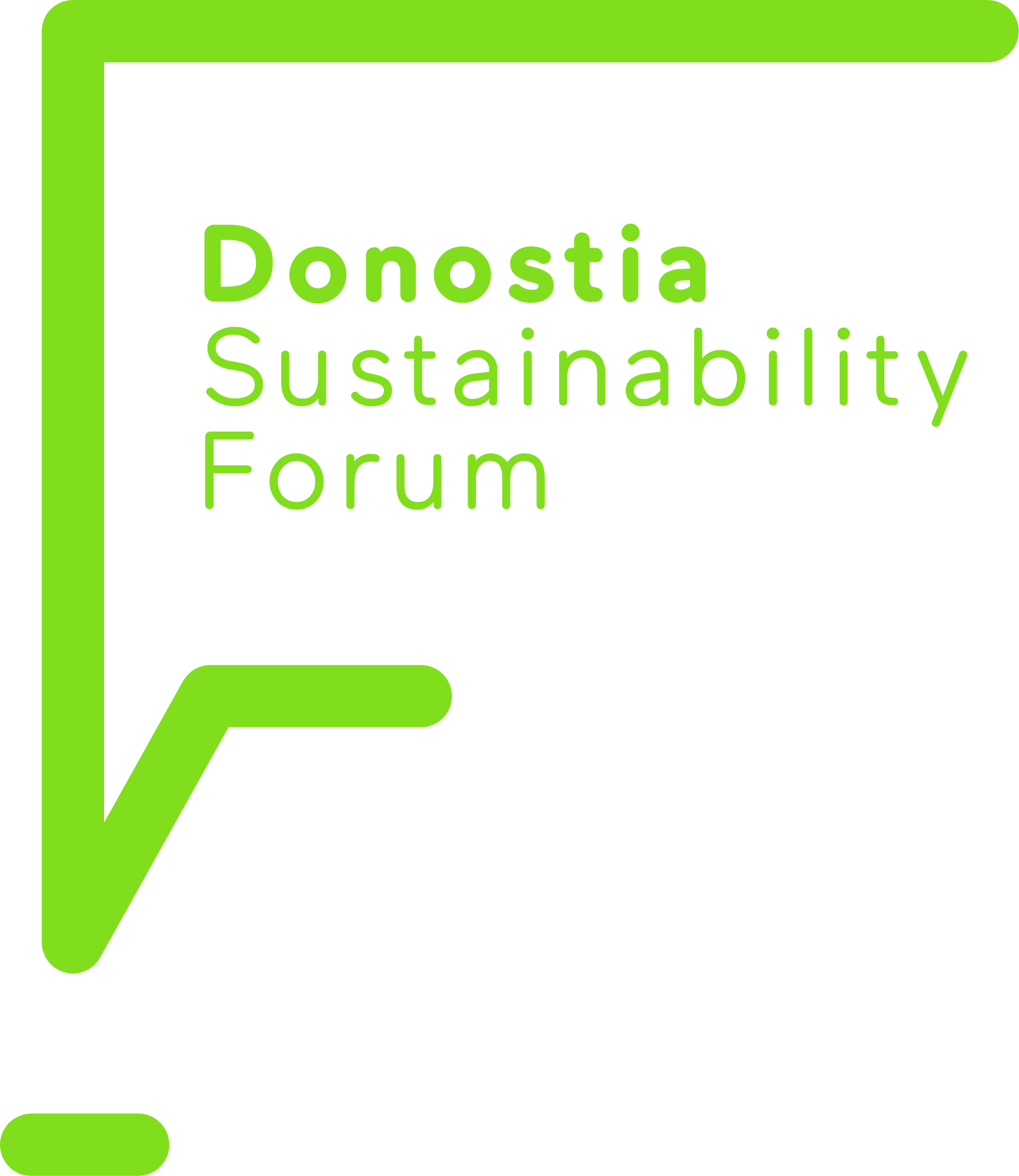Moda y sostenibilidad: los retos de la economía social y circular en el sector textil
El sector textil afronta un tsunami normativo y grandes retos que han llevado a agentes de la cadena de valor a tomar medidas. Este curso analiza su estado actual, los desafíos clave y las soluciones que impulsan la transición hacia una economía social y circular.
Description
El sector textil es el tercero a nivel mundial en consumo de agua y uso de suelos; y el quinto en uso de materias primas y emisiones GEI. Se requieren 7.500 litros de agua para producir unos vaqueros. El sector del vestido usa 93.000 millones de metros cúbicos de agua cada año, una cantidad suficiente para que sobrevivan 5 millones de personas. La industria de la moda es responsable del 20% del desperdicio total de agua a nivel global. La producción de ropa y calzado produce el 8% de los gases de efecto invernadero. Cada segundo se entierra o quema una cantidad de textiles equivalente a un camión de basura... estos datos nos dan una visión de la dimensión de los retos a los que nos enfrentamos si no tomamos medidas en la producción y gestión del textil.
El 1 de enero de 2025 entró en vigor la nueva normativa de la Unión Europea. Esta nueva directiva del 2018 obliga a los estados miembro a empezar la recogida selectiva de los residuos textiles y al establecimiento de unos objetivos para la reutilización y el reciclado de estos residuos. También queda prohibida la destrucción de excedentes textiles no vendidos. La ley contempla la Responsabilidad Ampliada del Productor (RAP), un concepto que expande las obligaciones de las empresas con sus productos. Busca implicar a fabricantes en el proceso de recuperación de los productos que generan y trasladar su responsabilidad sobre los productos que ponen en el mercado. Estas medidas, junto con otras relacionadas con el ecodiseño, están revolucionando el sector de la recogida, tratamiento y comercialización del textil post-consumo.
Y todo esto con un papel central de las empresas de inserción que son las que en este momento ejercen la actividad de recogida, tratamiento y reutilización/reciclaje de residuos textiles. La disposición adicional 19ª de la Ley 7/2022 ha establecido de forma pionera en el Estado y en la Unión Europea, la contratación reservada para empresas de inserción del 50% de los contratos públicos de recogida y tratamiento de los residuos textiles y muebles y enseres. Las empresas de inserción son entidades prestadoras de servicios de interés económico general (art. 5.4 de la Ley 5/2011, de 29 de marzo, de Economía Social), que es una excepción a los principios de libre concurrencia y libre mercado contemplada en el artículo 106 del Tratado de Funcionamiento de la UE.
En España las empresas de inserción recogen más de la mitad del residuo textil que se recoge separadamente. De esta forma, se consigue el acompañamiento e inserción laboral de personas en situación o riesgo de exclusión, contribuyendo a avanzar no sólo en sostenibilidad, sino también en economía social.
En este Curso de Verano, participarán agentes relevantes de la cadena de valor del proceso para compartir los retos a los que nos estamos enfrentando y divulgar la necesidad de un trabajo público-privado coordinado para poder abordar la contaminación provocada por el modelo de consumo actual.
Objectives
Compartir los retos del sector de la reutilización y reciclaje de la industria del textil en general, y de la moda en particular.
Analizar las buenas prácticas en la materia.
Poner en valor la economía social como herramienta fundamental para conseguir las metas de la reutilización.
Avanzar en la colaboración de agentes del ámbito y colaboración público-privada para abordar los retos del sector.
Activity directed to
- All public
- University student
- Students not from university
- Teachers
- Professionals
Program
17-07-2025
Registro / Erregistroa
Presentation by the Director of the activity
- Ane Salaberria Belasco | Emaus Gizarte Fundazioa - Ingurumen arduraduna / Responsable de Medio Ambiente
- Aitziber Zubillaga Murgiondo | Emaus Gizarte Fundazioa - Zuzendari nagusia / Directora General
“La sostenibilidad en la era del Fast Fashion: El estado del arte del sector textil “
Adaptación de los fabricantes
- Ane Salaberria Belasco | Emaus Gizarte Fundazioa - Ingurumen arduraduna / Responsable de Medio Ambiente
El rol de los gestores textiles
- Aitziber Zubillaga Murgiondo | Emaus Gizarte Fundazioa - Zuzendari nagusia / Directora General
SCRAP Textil: cambios en el marco normativo
- Alberto Fernández | SCRAP Re-viste - Director de operaciones
Round table: “Coloquio “
- Ane Salaberria Belasco | Emaus Gizarte Fundazioa - Ingurumen arduraduna / Responsable de Medio Ambiente (Moderator)
- Alberto Fernández | SCRAP Re-viste - Director de operaciones
- Aitziber Zubillaga Murgiondo | Emaus Gizarte Fundazioa - Zuzendari nagusia / Directora General
Preguntas público
Pausa café
Visita a centro de tratamiento textil de Errentería
“Visita guiada “
- Aitziber Zubillaga Murgiondo | Emaus Gizarte Fundazioa - Zuzendari nagusia / Directora General
- Mari Luz Ferro Fernandez | Koopera - Coordinadora general
Lunch y Brainstorming: ¿Retos y soluciones del sector?
18-07-2025
“Retos del sector textil ante la nueva regulación “
Papel de las instituciones
- Iñaki Puga Pueyo | Diputación Foral de Gipuzkoa - Transición Ecológica - Departamento Sostenibilidad
Contratos reservados
- Pedro Carrasco Jiménez | Koopera - Relaciones Institucionales
Necesidades curriculares /green skills
- Estíbaliz Sáez de Cámara Oleaga | UPV/EHU - Profesora e Investigadora
Aplicación en la industria
- Olga Martín García | ACLIMA - Directora General
Adaptación de los comercios
- Nerea Rodriguez | San Sebastian Shops - Gerentea
Round table: “Coloquio “
- Ane Salaberria Belasco | Emaus Gizarte Fundazioa - Ingurumen arduraduna / Responsable de Medio Ambiente (Moderator)
- Pedro Carrasco Jiménez | Koopera - Relaciones Institucionales
- Estíbaliz Sáez de Cámara Oleaga | UPV/EHU - Profesora e Investigadora
- Olga Martín García | ACLIMA - Directora General
- Nerea Rodriguez | San Sebastián Shops - Gerentea
Preguntas público
Paua café
“Impulsando la transición social y sostenible “
Moda Sostenible
- Gema Gómez De Pablo | Slow Fashion Next - Directora estratégica
Comercialización segunda mano
- Nati Yesares | AERESS - Equipo directivo
Reciclador textil
- Ana Rodes Carbonell | RECOVER - Directora Sostenibilidad
Inovacion textil
- Sònia Flotats Alvarez | MOVE! - Directora
Round table: “Coloquio“
- Ane Salaberria Belasco | Emaus Gizarte Fundazioa - Ingurumen arduraduna / Responsable de Medio Ambiente (Moderator)
- Gema Gómez De Pablo | Slow Fashion Next - Directora estratégica
- Nati Yesares | AERESS - Equipo directivo
- Ana Rodes Carbonell | RECOVER - Directora Sostenibilidad
- Sònia Flotats Alvarez | MOVE! - Directora
Preguntas público
Directors

Ane Salaberria Belasco
Emaus Gizarte Fundazioa
Ane Salaberria graduated in Environmental Sciences and has occupational health and safety training; her whole career has been in those fields, where she held roles of responsibilities in sector such as the automotive industry, renewable energies, research and equipment. She is currently at the Emaus Gizarte Fundazioa, where she is leading different projects linked to the circular economy.
Speakers

Pedro Carrasco Jiménez
PhD in Law. Expert compliance officer. Public procurement technician.

Alberto Fernández
Ingeniero Industrial por la Escuela Técnica de Ingenieros Industriales de Madrid. Comenzó su actividad profesional en el mundo de la gestión de residuos desde el área técnica de empresas como HUARTE SERVICIOS, Onyx Servicios Ciudad Limpia, Técnicas Medioambientales TECMED, del grupo ACS, Urbaser y Fomento de Construcciones y Contratas, FCC. Desde el año 2001 trabajó en ECOEMBES pasando por distintas áreas de responsabilidad en el área de gestión local y autonómica, como gerente de Comunidad de Madrid, Región de Murcia, Islas Canarias y Castilla y León, la relación con la FEMP y la asociación nacional de empresas públicas de medio ambiente ANEPMA; en su última etapa ocupó un puesto de gerente dentro de la dirección de Relaciones Eternas y Responsabilidad Social Corporativa. Fundador de Cirqlr Medio Ambiente, empresa especializada en la consultoría en economía circular y sistemas de responsabilidad ampliada del producto. Ha sido director de Operaciones de PROCIRCULAR, sistema colectivo de responsabilidad ampliada del productor para envases. Actualmente es director de Operaciones de RE-VISTE. Sistema colectivo voluntario de responsabilidad ampliada del productor para el residuos textil

Mari Luz Ferro Fernandez
KOOPERA
With more than 15 years’ experience in the solidarity-based and social economy, I am leading the Koopera Social Network strategy and operations as its General Coordinator, and driving social inclusion and the circular economy. Our network recovers over 18,500 tonnes of post-consumption textile and other waste a year, which generates job opportunities for thousands of vulnerable people. As a specialist in financial management, product quality and territorial development, I have coordnated teams and forged alliances with over 50 entities of the third sector, administrations and companies, where profitability meets social impact. My approach is clear: transforming business models into sustainable solutions where people are at the heart of the economy. More than a profession, it is my purpose.

Sònia Flotats Alvarez
Sònia Flotats Álvarez es directora de Move. Periodista por la Universitat Autónoma de Barcelona y con formación en Responsabilidad Social Corporativa por la UPF, dirección de ONG por Esade, y sostenibilidad en moda. Actualmente, lidera Move! Moda en Movimiento, una iniciativa de Modaes que tiene como objetivo posicionar a España como referente en sostenibilidad en el sector de la moda, integrando la responsabilidad ambiental y social como pilares estratégicos de la competitividad empresarial. Con experiencia en el ecosistema B Corp y en la comunicación de sostenibilidad, ha trabajado con marcas y empresas textiles para construir narrativas transparentes, honestas y creíbles, alineadas con la creciente demanda de un mercado más ético y consciente. Además, es docente en OBS Business School y ESIC, donde forma a futuras generaciones de profesionales en sostenibilidad, ecodiseño y comunicación en la industria de la moda. Su vocación educativa se complementa con su rol como miembro de WAS (Women Action Sustainability), DIRSE y el Pacte per a la Moda Circular.

Gema Gómez De Pablo
Es la Directora Ejecutiva de Slow Fashion Next, una plataforma de Formación, Consultoría y Ecosistema Profesional de Moda Sostenible que fundó en 2011 y que desde 2012 lleva a cabo anualmente la Jornada de Moda Sostenible que fue pionera en España y que este año celebra su 12ª edición. También imparte formación en diferentes Universidades y Escuelas de Negocio, en España y fuera, como el IE, CUNEF, el CSDMM y empresas como El Corte Inglés, Mango, Línea Directa en Colombia o Gioseppo. También es speaker internacional y ha impartido charlas en Brasil, Colombia, Perú, México y Chile, entre otros. Gema también ha sido Coordinadora y co-coordinadora nacional durante seis años de la campaña global Fashion Revolution en España y actualmente realiza proyectos de consultoría. También es impulsora del Directorio para el Ecosistema de la Moda y Textil Sostenible, Circular y Regenerativa de habla hispana que acaba de lanzar su herramienta de trazabilidad y transparencia y de su Foro Profesional de Networking de Slow Fashion Next.

Olga Martín García
ACLIMA, Basque Environment Cluster, Directora General
She holds a degree in Chemistry (University of the Basque Country) and an Executive MBA (University of Barcelona). She has extensive professional experience in companies, particularly in VIDRALA, where she has held various management positions. She has participated as a representative in important glass sector associations such as FEVE - European Federation of glass packaging and glass tableware makers and ANVEFI - National Association of Glass Packaging Manufacturers, and in glass consortiums in the field of innovation such as IPGR or ICG. Olga Martín is currently the General Manager of Aclima. Her commitment to the cluster and its Strategic Plan is to position the Basque environmental sector as a lever of competitiveness for the rest of the sectors. Aclima-Basque Environment Cluster is the reference point for the environmental sector in the Basque Country. It represents the private sector as well as the sphere of knowledge and the public sector.

Iñaki Puga Pueyo
GIPUZKOAKO FORU ALDUNDIA
Ingeniero en Organización Industrial, Jefe de Servicio de Transición Ecológica de la Diputación Foral de Gipuzkoa. Ha desarrollado toda su carrera profesional en la administración pública como responsable de medio ambiente. En estos momentos su trabajo está centrado en impulsar la transición energética, la economía circular y la lucha contra el cambio climático.

Ana Rodes Carbonell
Experta en sostenibilidad corporativa y ESG en el sector textil, y una apasionada por la comunicación y divulgación sobre moda sostenible. Cree que la transformación sostenible de la industria es posible, y quiere ser parte de ese cambio. Combina formación técnica con una mente creativa: es Ingeniera Industrial, Máster y Doctora Cum Laude en Ingeniería Textil por la Universidad Politécnica de Valencia. Y, además de todo el aprendizaje autodidáctica, se especializo en Liderazgo en Sostenibilidad por IE Business School y en Desarrollo Sostenible por IESE Business School. Como Head of Sustainability en Recover, trabaja para contribuir a esa transformación sostenible. Sus especialidades incluyen Next Gen Materials, descarbonización, economía circular, comunicación sostenible, eco diseño, regulación, reporting y cadenas de suministro responsables, entre otros.

Nerea Rodriguez
Nerea Rodríguez Julio es directora gerente de San Sebastián Shops, la Asociación de Comerciantes de San Sebastián, que agrupa a la mayoría de los comercios textiles de la ciudad, incluidos numerosos establecimientos de segunda mano surgidos en los últimos años. Desde esta posición, Nerea aporta un profundo conocimiento del mercado local, el marketing comercial y las tendencias de consumo, así como una visión privilegiada de la convivencia entre el comercio textil tradicional y el de segunda mano. Su trayectoria le permite analizar con perspectiva los cambios en los hábitos de compra y los retos que afronta el comercio urbano en un contexto de transformación social y económica.
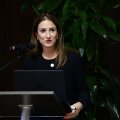
Estíbaliz Sáez de Cámara Oleaga
Universidad del Pais Vasco/Euskal Herriko Unibertsitatea (UPV/EHU)
PhD in Environmental Engineering and professor in the ‘Environmental Technologies’ area in the Department of Chemical Engineering of the Environment at Bilbao Engineering School (UPV/EHU). From 2017 to 2025 she was the Director of Sustainability and Social Commitment at the UPV / EHU. She is a member of the Academic Committee of the Master Circular Economy: Business Aplication. Furthermore, she is the president of the Spanish Network for Sustainable Development (REDS). Currently, she is Deputy Director of Quality, Sustainability, and Dual Education at Bilbao Engineering School (UPV/EHU)

Ane Salaberria Belasco
Emaus Gizarte Fundazioa
Ane Salaberria graduated in Environmental Sciences and has occupational health and safety training; her whole career has been in those fields, where she held roles of responsibilities in sector such as the automotive industry, renewable energies, research and equipment. She is currently at the Emaus Gizarte Fundazioa, where she is leading different projects linked to the circular economy.

Nati Yesares
Nati Yesares, ambientóloga y responsable de Medio Ambiente en Solidança desde 2009, con formación en gestión de proyectos y amplia experiencia en gestión de residuos municipales, educación ambiental y proyectos de economía social. Responsable de los proyectos de innovación y economía circular de la entidad y de impulso de acciones que promuevan la economía social y oportunidades laborales para colectivos vulnerables. Es miembro de la junta directiva de AERESS

Aitziber Zubillaga Murgiondo
Emaus Gizarte Fundazioa
Aitziber Zubillaga Murguiondo has been the Emaús Gizarte Foundation General Manager since October 2023. She joined the Foundation to lead a new stage in the organisation and bolster its purpose moving forward. Aitziber studied management, strategy and transformation; she has taken part in and led projects in different areas of activity, ranging from culture to the field of innovation in ageing, training and dissemination. This new stage will see Emaús Gizarte Foundation consolidating its role as a social transformation agent to contribute to the construction of a society that is fairer, more cohesive and which cares for the environment; the emphasis will be on being people centric and part of change processes focused on society and personalised inclusion processes.
Registration fees
| Face-to-face | Until 30-06-2025 | Until 17-07-2025 |
|---|---|---|
| 25,00 EUR | 61,00 EUR | |
| - | 87,00 EUR | |
| - | 74,00 EUR | |
| - | 61,00 EUR | |
| - | 74,00 EUR | |
| - | 74,00 EUR | |
| - | 74,00 EUR |
| Live online | Until 30-06-2025 | Until 17-07-2025 |
|---|---|---|
| 25,00 EUR | 61,00 EUR | |
| - | 87,00 EUR | |
| - | 74,00 EUR | |
| - | 61,00 EUR | |
| - | 74,00 EUR | |
| - | 74,00 EUR | |
| - | 74,00 EUR |
Venue
Miramar Palace
Pº de Miraconcha nº 48. Donostia / San Sebastián
Gipuzkoa
Miramar Palace
Pº de Miraconcha nº 48. Donostia / San Sebastián
Gipuzkoa
Sustainable development goals
Agenda 2030 is the new international development agenda approved in September 2015 by the United Nations. This agenda aims to be an instrument to favour sustainable human development all over the planet, and its main pillars are the eradication of poverty, a reduction in equality and vulnerability and fostering sustainability. It is a unique opportunity to transform the world up to 2030 and guarantee human rights for all.

8 - Decent work and economic growth
Foster sustained, inclusive and sustainable economic growth, full and productive employment and decent work for everyone. Key issues: decent work, full and productive employment, entrepreneurship, fostering micro-companies and SMEs, employment rights, safe working environments, youth employment, equal opportunities and pay, strengthening of financial institutions, and breaking the link between economic growth and the degradation of the environment.
More information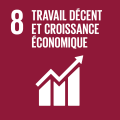
10 - Reduced inequalities
Reduce inequality in countries and between them. Key issues: promotion of the social, economic and political inclusion of all people, equal opportunities, fiscal, wage and social protection policies to favour equality, migration and the policies that affect it, official assistance for the development, regulation and supervision of world institutions and markets.
More information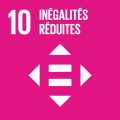
11 - Sustainable cities and communities
Make cities and other human settlements inclusive, safe, resilient and sustainable. Key issues: access to suitable housing and basic services that are secure and affordable, suitable and sustainable transport systems, inclusive urban planning, participative planning and management, protection of cultural and natural heritage, air-quality, green zones, and connections between urban, peri-urban and rural areas.
More information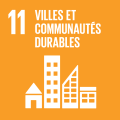
12 - Responsible consumption and production
Guarantee sustainable modalities of consumption and production. Key issues: sustainable management and efficient use of natural resources, reduction of chemical particles released to the atmosphere, water and soils, reduction of waste products, recycling, reuse and reduction, sustainable practices, sustainable public procurement, sustainable lifestyles, rationalisation of inefficient subsidies for fossil fuels.
More information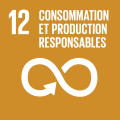
13 - Climate action
Adopt urgent measures to combat climate change and its effects. Key issues: mitigation, resilience and capacity for adaptation, planning, national strategies and plans, education and raising awareness, reduction of effects and early warning systems, compliance with the Framework Convention of the United Nations on Climate Change.
More information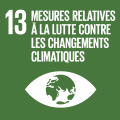
16 - Peace, justice and strong institutions
Foster peaceful and inclusive societies for sustainable development, facilitate access to justice for everyone and construct efficient and inclusive institutions that are accountable at all levels. Key issues: a reduction in violence, mistreatment and exploitation, the rule of law, equal access to justice, a reduction in corruption and bribery, efficient and transparent institutions, participation, access to information, protection of fundamental freedoms.
More information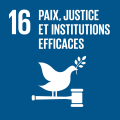
17 - Partnerships for the goals
Strengthen the means of implementation and revitalise the World Alliance for Sustainable Development. Key issues: mobilisation of resources, 0.7% of GDP for official overseas development aid, finances, cooperation in technology and innovation, ecologically rational technologies, skills building, universal and multilateral trade system, coherence on the legislative and institutional levels, availability of data, supervision, indicators and accountability.
More information